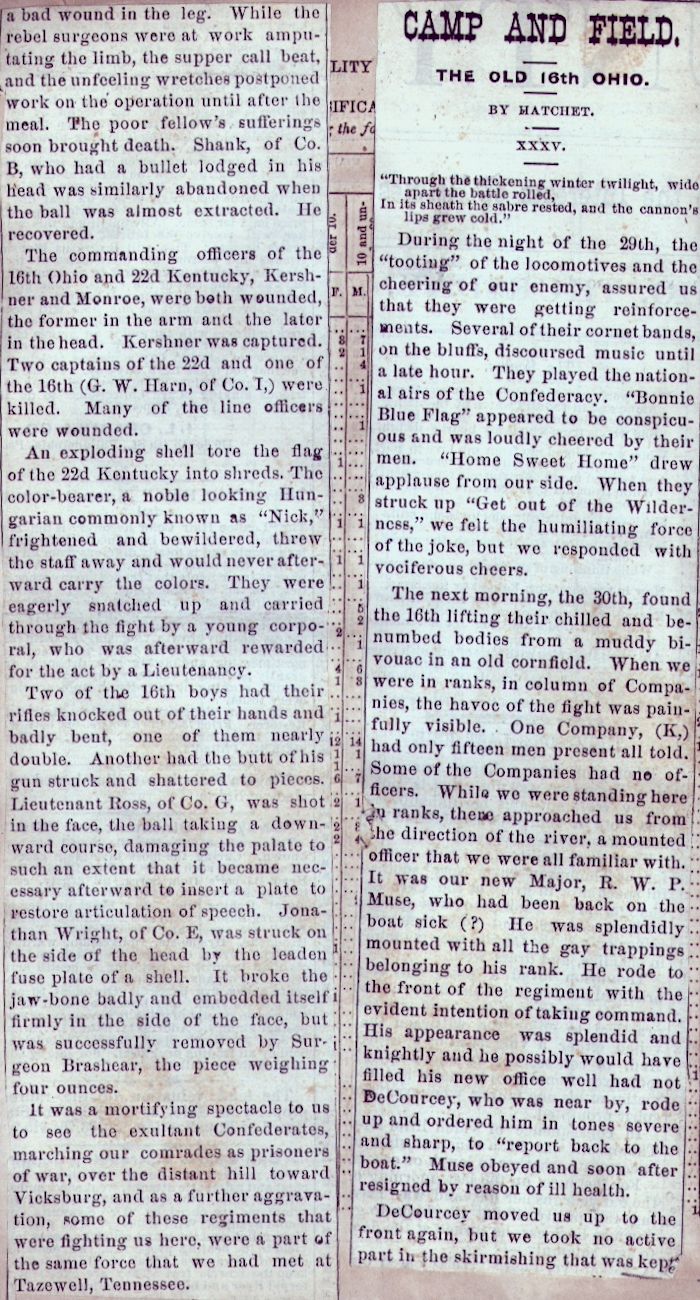| Camp & Field Page 55 | Camp & Field Index Page | 16th OVI Home Page | Camp & Field Page 57 |
The Camp & FieldArticles by Theodore Wolbach |
 Cpl. Theodore D. Wolbach |
The following image is taken from a book titled "Mortality and Statistics of the Census of 1850" in which it is believed retired Captain Rezin H. Vorhes, Company H, pasted over the pages a series of articles written by Cpl. Theodore D. Wolbach, Company E, titled "Camp and Field" and published, by chapter, in the Holmes County (Ohio) Republican newspaper from February 24, 1881 to August 17, 1882. The articles tell the story, in great detail and color, of the 16th OVI, from the inception of the 3-year regiment in October, 1861, through all its camps, battles and marches until it was disbanded on October 31, 1864. The articles pasted in the Vorhes book cover the first 35 chapters, published through October 20, 1881. All the remaining chapters were recently found in a Holmes County library by researcher Rob Garber who obtained copies, performed the transcriptions and provided to this website and which are also presented here, thus providing the complete work by Theodore Wolbach.
Throughout these articles click on the underlined white text for additional details.
The webauthor thanks 16th Ohio descendant Rob Garber for his excellent research on the Camp And Field articles and for performing the tedious digital transcription of those articles found on each page. The transcriptions were made to reflect the original articles verbatim, misspellings and all. Rob is the 3rd great nephew of Capt. William Buchanan, Company F, 16th Ohio, who served in the 90-day regiment as a private, re-enlisting in the three year regiment, and eventually making the rank of Captain of Company F. Thanks Rob!
Page 56 - Chapter 34, 35 - December, 1862
 |
a bad wound in the leg. While the rebel surgeons were at work amputating the limb, the supper call beat, and the unfeeling wretches postponed work on the operation until after the meal. The poor fellow's sufferings soon brought death. Shank, of Co. B, who had a bullet lodged in his head was similarly abandoned when the ball was almost extracted. He recovered. The commanding officers of the 16th Ohio and 22d Kentucky, Kershner and Monroe, were both wounded, the former in the arm and the later [sic] in the head. Kershner was captured. Two captains of the 22d and one of the 16th (G.W. Harn, of Co. I,) were killed. Many of the line officers were wounded. An exploding shell tore the flag of the 22d Kentucky into shreds. The color-bearer, a noble looking Hungarian commonly known as Two of the 16th boys had their rifles knocked out of their hands and badly bent, one of them nearly double. Another had the butt of his gun struck and shattered to pieces. Lieutenant Ross, of Co. G, was shot in the face, the ball taking a downward course, damaging the palate to such an extent that it became necessary afterward to insert a plate to restore articulation of speech. Jonathan Wright, of Co. E, was struck on the side of the head by the leaden fuse plate of a shell. It broke the jaw-bone badly and embedded itself firmly in the side of the face, but was successfully removed by Surgeon Brashear, the piece weighing four ounces. It was a mortifying spectacle to us to see the exultant Confederates, marching our comrades as prisoners of war, over the distant hill toward Vicksburg, and as a further aggravation, some of these regiments that were fighting us here, were a part of the same force that we had met at Tazewell, Tennessee. |
Published in Holmes County Republican XXXV.
During the night of the 29th, the The next morning, the 30th, found the 16th lifting their chilled and benumbed bodies from a muddy bivouac in an old cornfield. When we were in ranks, in column of Companies, the havoc of the fight was painfully visible. One Company, (K,) had only fifteen men present all told. Some of the Companies had no officers. While we were standing here in ranks, there approached us from the direction of the river, a mounted officer that we were all familiar with. It was our new Major, R.W.P. Muse, who had been back on the boat sick (?) He was splendidly mounted with all the gay trappings belonging to his rank. He rode to the front of the regiment with the evident intention of taking command. His appearance was splendid and knightly and he possibly would have filled his new office well had not DeCourcey, who was near by, rode up and ordered him in tones severe and sharp, to DeCourcey moved us up to the front again, but we took no active part in the skirmishing that was kept |
| Camp & Field Page 55 | Camp & Field Index Page | 16th OVI Home Page | Camp & Field Page 57 |